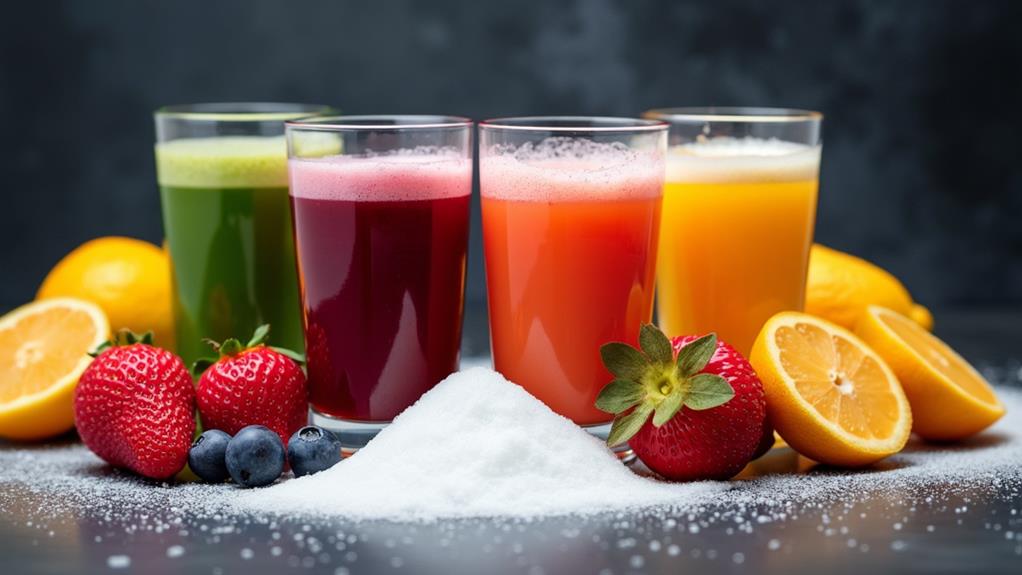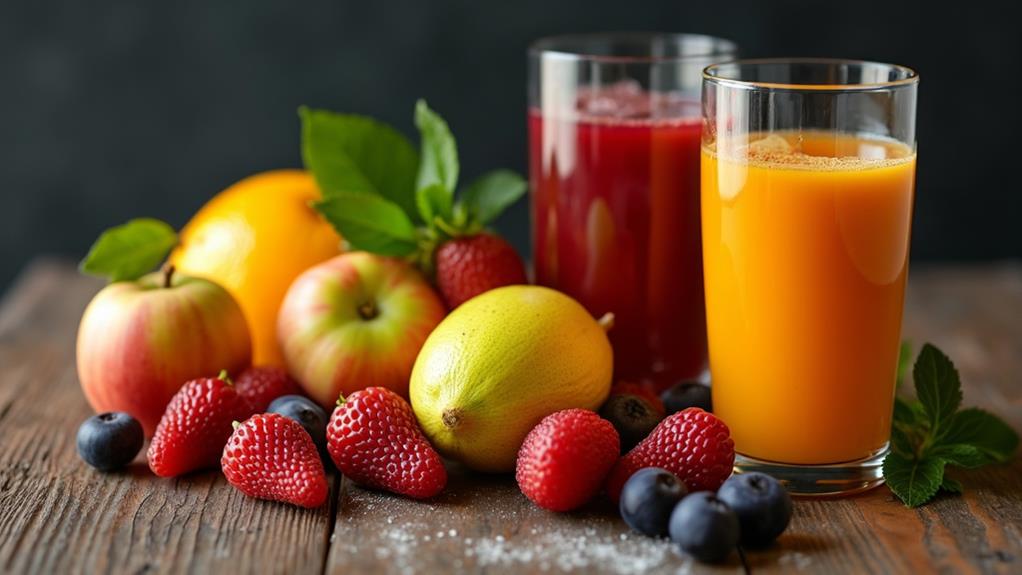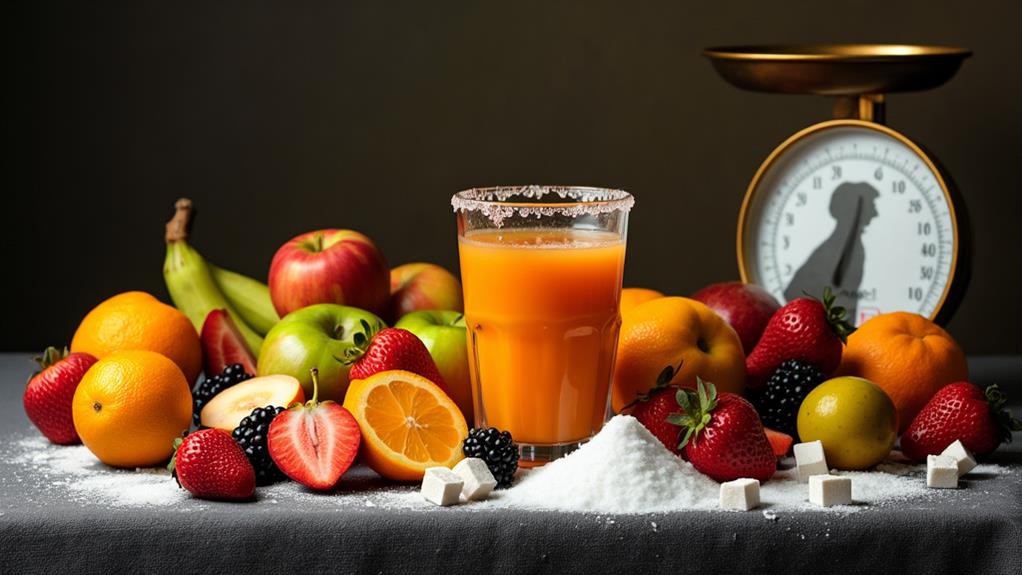Can Drinking Fruit Juice Lead to Weight Gain?

Drinking fruit juice can lead to weight gain if you indulge too much. It's packed with sugar and lacks the fiber found in whole fruits that keep you full and aid digestion. When you drink juice, the sugar quickly spikes blood glucose levels, which can encourage fat storage and increase the risk of insulin resistance. This is why high juice consumption is linked to a rise in Body Mass Index (BMI) for both children and adults. If you're curious about how whole fruits compare and tips for balanced nutrition, there's more intriguing information to uncover.
Effects of Juice on BMI
When you drink fruit juice regularly, your BMI can slightly increase over time. Each extra daily serving of 100% fruit juice is linked to a 0.03 increase in BMI for children and 0.02 for adults, showing how juice intake contributes to weight gain. The calories from fruit juice, primarily from liquid sugars, are absorbed quickly due to the lack of fiber found in whole fruit. This rapid absorption can lead to spikes in blood glucose levels, which may further promote weight gain.
Children, in particular, face greater risks when consuming large amounts of juice. High consumption, defined as 16-24 ounces per day, greatly impacts BMI. The liquid form of calories doesn't trigger the same fullness signals as whole fruit, leading to increased calorie intake and potential weight gain. The American Academy of Pediatrics suggests limiting juice intake, especially for children under six, to prevent obesity.
Managing your juice intake is essential for maintaining a healthy BMI. Opting for whole fruit instead, which contains beneficial fiber, can help regulate blood sugar levels and reduce the risk of excess weight gain. It's vital to be mindful of how much fruit juice you consume daily.
Juice Versus Whole Fruit
Choosing between juice and whole fruit can greatly impact your health and weight management. Whole fruits offer vital fiber that aids digestion and helps regulate your appetite, reducing the likelihood of overeating. On the other hand, fruit juice lacks this fiber, leading to quicker sugar absorption and increased calorie intake. This can make it easier to consume excess calories without feeling full, contributing to weight gain.
A standard serving of fruit juice (4 oz) can pack the same calories and sugars as several whole fruits, making it challenging to control calorie intake. Research shows that consuming whole fruits is linked to better weight management. Increasing whole fruit intake by just one serving per day may lead to about a pound of weight loss over three years. In contrast, juice consumption is associated with slight increases in body mass index (BMI). For each extra serving of juice, children's BMI increases by 0.03 and adults' by 0.02, even when adjusting for caloric intake.
National guidelines suggest limiting fruit juice to 4-8 oz daily. Prioritizing whole fruits over juice offers greater nutritional benefits and aids in maintaining a healthier BMI.
Sugar Content in Juices

Many people underestimate the sugar content in fruit juices, which can considerably impact your daily sugar intake. A 6-ounce serving of 100% fruit juice packs around 15-30 grams of sugar, elevating your caloric content by 60-120 calories per serving. While these numbers might seem small, they accumulate quickly, especially if you're drinking multiple servings throughout the day. Unlike whole fruits, fruit juices lack dietary fiber, leading to rapid sugar absorption and potential spikes in blood glucose levels.
This quick sugar uptake can have significant consequences. Excess fructose from fruit juice is easily converted to fat in the liver, contributing to weight gain. Over time, this can lead to an increase in your body mass index (BMI), a key indicator of if you're at a healthy weight. Studies show that each extra serving of fruit juice correlates with a 0.03 BMI increase for children and 0.02 for adults, emphasizing the impact on your weight.
Moreover, consistent high sugar content intake from fruit juice can lead to several health issues beyond weight gain. It's essential to be aware of these effects, as they can subtly influence your health and well-being over time.
Health Implications of Juicing
You might think that a glass of fruit juice is a healthy choice, but it's significant to contemplate its health implications. Drinking too much fruit juice can lead to rapid spikes in blood sugar levels, increasing the risk of insulin resistance and ultimately, weight gain. Unlike whole fruits, juices lack dietary fiber, which plays an essential role in managing these spikes and promoting satiety.
The American Academy of Pediatrics (AAP) has noted the health risks associated with juice consumption, especially for children. They've observed that each extra serving can raise a child's BMI by 0.03. This shows a strong link between fruit juice intake and weight gain in younger populations. As a result, the AAP recommends limiting juice for children under 6 years old to prevent obesity and dental issues.
Nutritional guidelines suggest treating juice as an occasional treat, not a daily staple. Here's a quick guide:
- Children under 6: Limit juice intake to reduce health risks.
- Teens and Adults: Keep it to 8 oz/day to manage calorie intake.
- Whole fruits over juices: Aim for fiber-rich options to aid digestion.
These guidelines help mitigate the negative health implications of juicing.
Role of Fiber in Diet

Fiber plays a vital role in maintaining a healthy diet. When you consume whole fruits, you're taking in significant amounts of fiber, which helps regulate digestion and promotes a feeling of fullness. This sense of satiety is important in managing your calorie intake and can be a powerful ally in preventing weight gain. Unlike fruit juice, which lacks fiber, whole fruits slow down the absorption of sugars, helping you maintain stable blood sugar levels.
Healthcare professionals often highlight the significance of including fiber-rich foods in your daily nutrition. The fiber content in whole fruits typically ranges from 2 to 6 grams per serving, which is necessary for providing nutrients lost during juice processing. Research suggests that increasing your whole fruit intake by just one serving per day can lead to weight loss over time. This is primarily due to the satiating effect of fiber, which supports healthy weight management.
High-fiber diets are associated with lower risks of obesity and chronic diseases. By choosing whole fruits over juice, you're not only reducing your calorie intake but also enhancing your general health. Make fiber a priority in your diet to support long-term wellness.
Healthy Alternatives to Juice
When looking for healthy alternatives to fruit juice, whole fruits should top your list. Whole fruits offer vital nutrients and fiber that aid in digestion and help control your appetite, promoting better weight management. By increasing your intake of fresh fruit, you can enjoy their lower calorie density and high fiber content, which can contribute to weight loss over time.
Here are some creative ways to increase your fruit intake:
- Add sliced fruits to cereal or oatmeal - Start your day with a fiber-rich breakfast by adding fresh fruit like bananas or berries to your morning bowl.
- Incorporate berries into pancake batter - Improve your pancakes by mixing in blueberries or raspberries, adding flavor and nutrients without excess calories.
- Mix fruits into salads - Raise your salads by tossing in sliced apples or oranges, delivering a sweet, nutritious twist.
Dried fruits such as raisins, dates, or apricots are also nutritious alternatives. They're convenient and offer the benefits of whole fruit. Just keep an eye on portion sizes to manage calorie intake. Prioritize fresh, whole fruits by exploring local grocery stores or farmers markets for seasonal options to support your healthy eating habits.
Myths About Sugar and Weight

Despite widespread beliefs, sugar's role in weight gain and hyperactivity is often misunderstood. Many people think sugar consumption directly causes hyperactivity in children, yet research shows no strong link exists. It's also vital to recognize that not all sugars are created equal. Natural sugars found in whole fruits are quite different from added sugars in processed foods. The latter pose greater health implications, contributing to weight gain and metabolic disorders.
When it comes to fruit juice, many assume it's a healthy choice over sugary drinks. However, 100% fruit juice can contain 15-30 grams of sugar per serving, which is comparable to soda. This high sugar content results in significant calorie intake without the fiber and nutrients you get from whole fruits. This can lead to fat accumulation in the liver, ultimately contributing to weight gain.
Understanding the difference between sugar sources and their health implications is fundamental. Excessive fructose, particularly from fruit juice, heightens the risk of metabolic disorders. By staying informed about the types of sugars and their effects, you can make better dietary choices and manage your weight more effectively.
Strategies for Balanced Nutrition
Prioritizing whole fruits over fruit juices supports better weight management due to their higher fiber content, which aids digestion and helps regulate appetite. By simply adding one serving of whole fruits like apples, pears, or berries to your daily routine, you can reduce your caloric intake and potentially lose about one pound over three years. Whole fruits also provide vital vitamins and minerals, contributing to a more balanced diet without the added sugars often found in juices.
To manage juice intake and combat obesity, especially in children, consider these strategies:
- Limit Juice Consumption: Follow guidelines like those from the American Academy of Pediatrics, recommending limited juice intake for children under six, fostering healthier hydration habits with water instead.
- Enhance Meal Variety: Incorporate whole fruits creatively into meals—think sliced apples in salads or berries on yogurt—to improve nutrition effortlessly.
- Opt for Smoothies: Blend whole fruits into smoothies for a nutritious, fiber-rich alternative to juice, ensuring a balanced diet without excess sugars.




